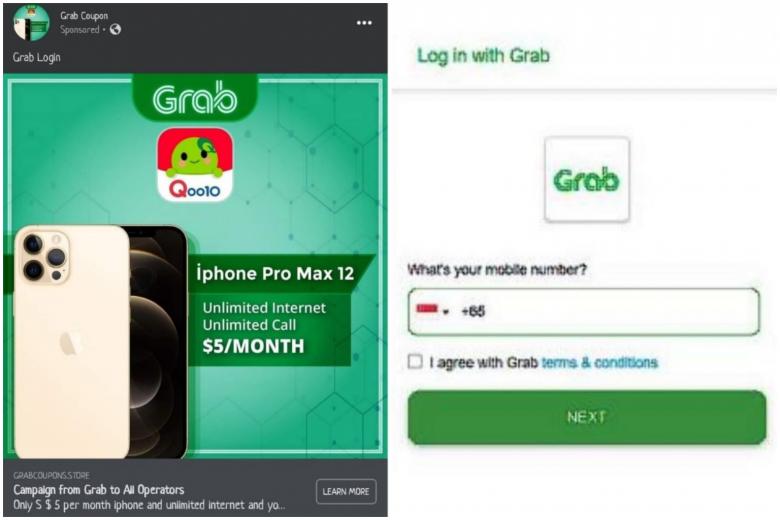SINGAPORE - A new variant of phishing scam involving fake Grab advertisements has surfaced here, the police said on Wednesday (Oct 28).
In these cases, victims would see fake Grab advertisements on Facebook or Instagram, offering cheap iPhone deals or Grab coupons.
When they click on the link embedded in the advertisement, victims are directed to a fake Grab website where they are required to provide their mobile phone number for a one-time password (OTP).
The police said most victims only realised they were scammed when they discovered unauthorised transactions in their GrabPay accounts, which is a digital wallet that can be used for transactions at over 10,000 merchants.
Grab confirmed in a statement on its website that it did not put out these advertisements and that all ride bookings, promotional or otherwise, should be made on the Grab app.
The ride-hailing company added that all promotional information should come from official sources such as the Grab SG Facebook page, the Grab blog, in-app notifications and e-mails sent from a verified Grab domain.
This is not the first phishing scam involving GrabPay.
The police said in March they had received at least 16 reports of impersonation scams on social media in which victims were tricked into disclosing their mobile number and Grab OTPs. The total amount cheated was at least $8,000.
In these cases, scammers would impersonate the victims' friends on Facebook and Instagram, and ask for their personal and banking details on the pretext of helping them sign up for fake contests or promotions by Lazada and Shopee.
With the victim's mobile number and Grab OTP, the scammers made fraudulent transactions on the UniPin store, an online platform to top up game credits that can be used in a variety of online games.
The police advised members of the public to be wary of links in unsolicited advertisements and text messages, especially when the deals seem too good to be true.
They should also verify the authenticity of the information through the official website and avoid disclosing their personal or Internet banking details to anyone.
Those who have experienced fraudulent transactions involving their e-payment accounts should report it to their service provider immediately.
For scam-related advice, the public can call the anti-scam helpline on 1800-722-6688 or visit the Scam Alert website.
Those who wish to provide information on scams may call the police on 1800-255-0000 or report it here.


